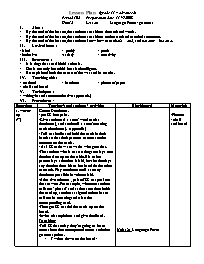Bài soạn môn học Tiếng Anh 11 - Period 102 - Unit12: Lesson: Language Focus - Grammar

I. Aims :
- By the end of the lesson, the students are able to form related words.
- By the end of the lesson, the students are able to understand and use cleft sentences.
- By the end of the lesson, the students know how to use both and, and not only but also.
II. Lexical items :
-label - purify - profit
-inclusive -satisfy - creativity
III. Structures :
- It is dogs that are faithful animals.
- She is not only beautiful but also intelligent.
- He explained both the causes of the war and its results.
IV. Teaching aids:
- textbook - handouts - pieces of paper
- chalk and board
V. Techniques :
- writing-based ( communicative
Bạn đang xem tài liệu "Bài soạn môn học Tiếng Anh 11 - Period 102 - Unit12: Lesson: Language Focus - Grammar", để tải tài liệu gốc về máy bạn click vào nút DOWNLOAD ở trên
Lesson Plan (grade 11 – advanced) Period 102 : Preparation date :11 /3/2008 Unit12 : Lesson : Language Focus- grammar Aims : By the end of the lesson, the students are able to form related words. By the end of the lesson, the students are able to understand and use cleft sentences. By the end of the lesson, the students know how to use both and, and not only but also. Lexical items : -label - purify - profit -inclusive -satisfy - creativity Structures : It is dogs that are faithful animals. She is not only beautiful but also intelligent. He explained both the causes of the war and its results. Teaching aids: - textbook - handouts - pieces of paper - chalk and board Techniques : - writing-based ( communicative approach.) Procedures : State/time Teacher’s and students’ activities Blackboard Materials 1. warm-up (7’) Game: Dominoes. - put SS into pairs. -Give students A a set of word cards ( dominoes), and student B a set of meaning cards (dominoes). (appendix) - Tell to shuffle and hold the cards in their hands so that their partners cannot see the contents on the cards. - Ask SS to draw straws for who goes first. -The student who is to start the game lays one domino face up on the table. His or her partner lays a domino is laid, he/she then lays any domino from his or her hand for the other to match. Play continues until as many dominoes possible have been laid. -After five minutes , pair off SS to speak out the answers. For example, when one student calls out “please” and at the same time holds the card up, another assigned student has to call out its meaning and raise the corresponding card. -Then get SS to stick the cards up on the board. -Invite class opinions and give feedback. Transition: -Tell SS that today they’re going to learn more about these compound nouns and other grammar points. T writes down on the board : Unit 12: Language Focus -Pictures - chalk and board 2. word study (12’) 3. Grammar (22’) Word derivation -Elicit words related to the verbs on the board, i ,e; get SS to give the equivalent nouns , adjectives and adverbs (task a, textbook,p.169) -Call on SS to speak out the answers. -Invite class opinions and give feedback. -Draw SS attention to the stress changes in certain parts of speech. Activity 1 : Transformation (task1,p.169) - Put SS into pairs - ask SS to fill each gap with the correct word form - call on some SS to speak out the answers and then write them up on the board - go over the answers with the class. Activity 2: Error recognition and correction: - give each student a copy of the task Cleft sentences: - these are sentences introduced by it is / it was. Different parts of the sentence can be emphasized in this way. + subject focus + objective focus + adverbial focus - who is usually used for proper subjects. That is usual for non-personal subjects - when the object is a proper noun, that is more usual than who. With all other objects, that is the correct form. Ex: + It was Sue who sent me a letter yesterday + It was a letter that Sue sent me + It was yesterday that Sue sent me a letter - textbook - Chalk and board Textbook 3. Homework (1’) Writing - have SS write sentences that are true themselves, using both and , and not only but also. . -Handout
Tài liệu đính kèm:
 p102.doc
p102.doc





